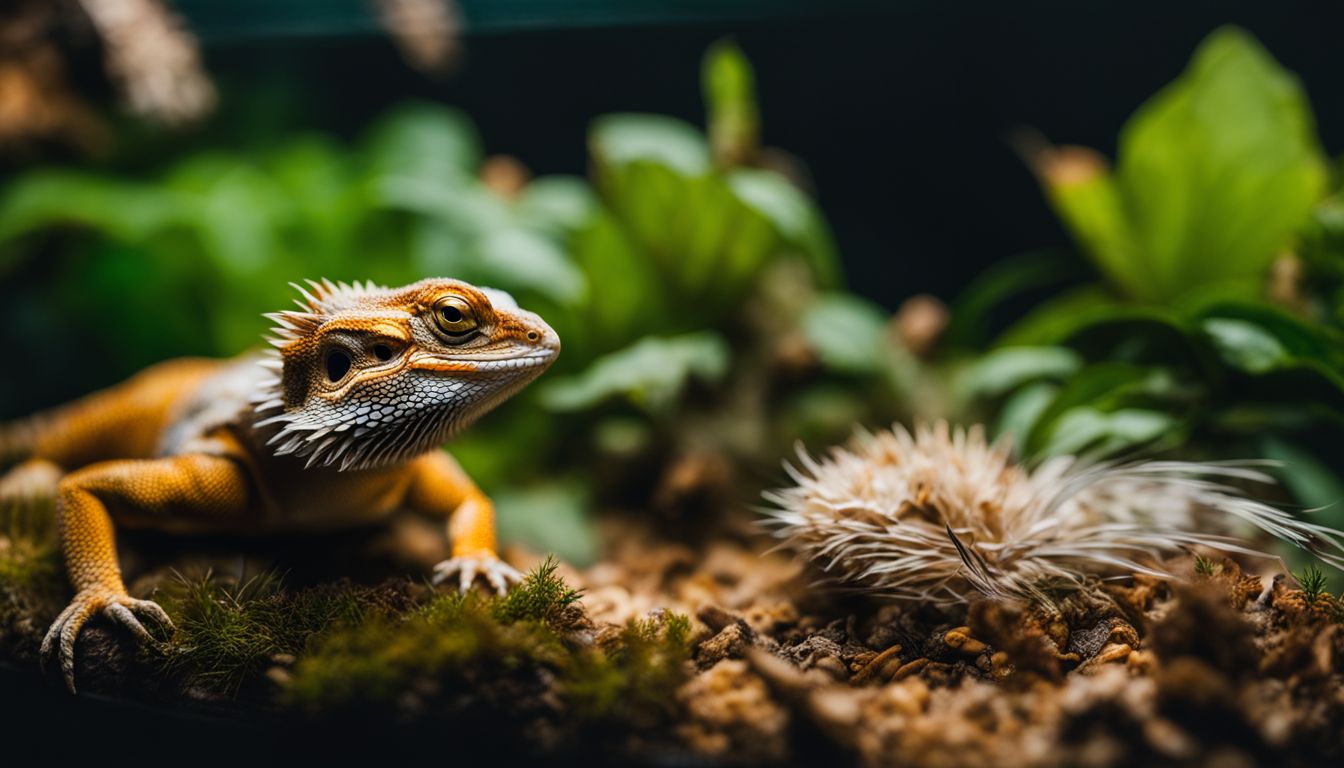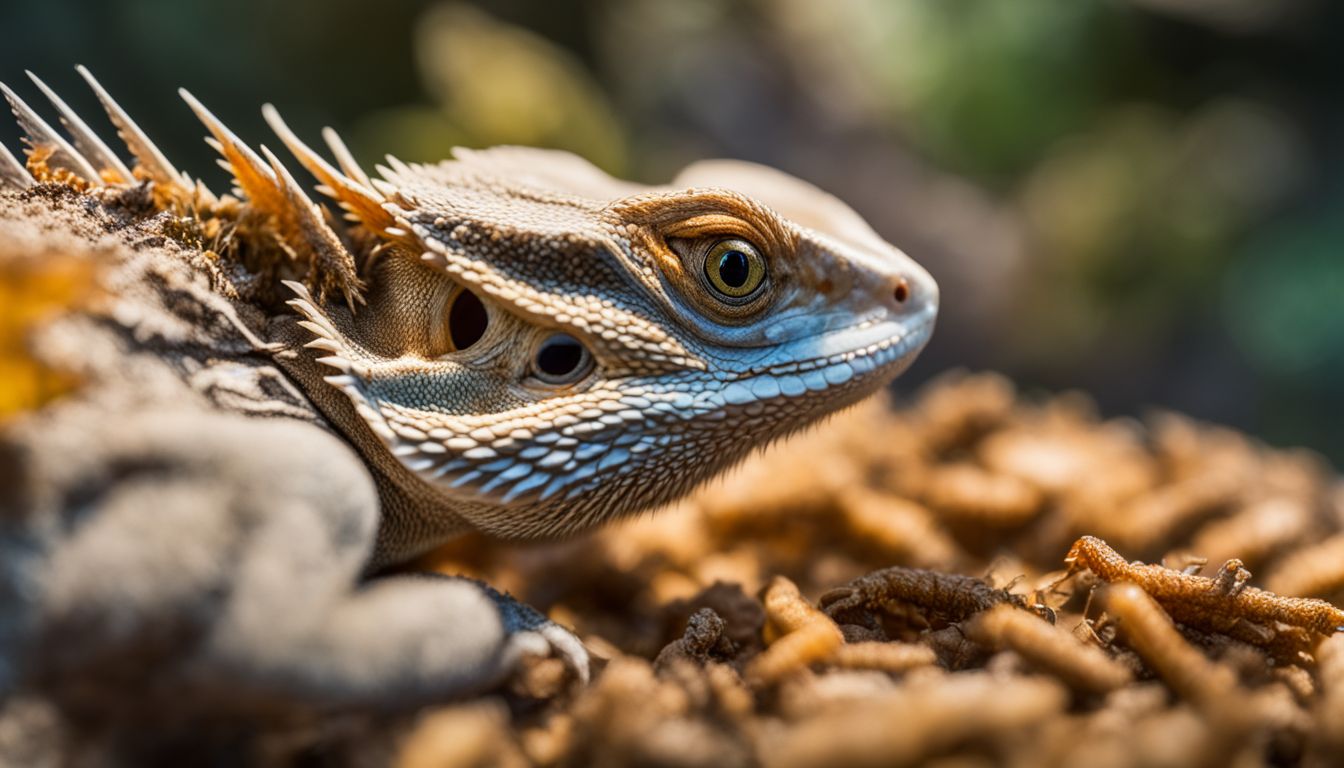Many pet owners wonder if their bearded dragons can safely eat mealworm beetles. Here’s a fact: mealworm beetles, when gut-loaded, are a nutritious treat for these reptiles. This article will guide you on how to incorporate them into your bearded dragon’s diet responsibly and the benefits they bring.
Keep reading to learn more!
Can Bearded Dragons Eat Mealworm Beetles?

Bearded dragons can eat mealworm beetles, but only as an occasional treat. These insects are not the best choice for their regular diet. Mealworms that have turned into beetles tend to be harder and have more exoskeleton than younger worms, making them less digestible for your pet.
Plus, these beetles might secrete a bad scent that could put off your bearded dragon.
It’s important to know that feeding mealworm beetles comes with potential risks. Their hard bodies can lead to blockage in bearded dragons if they eat too many. Always consider safer, more nutritious treats that match a bearded dragon’s dietary needs better than mealworm beetles do.
The Benefits of Feeding Your Bearded Dragon Mealworms and Beetles

Feeding your bearded dragon mealworms and beetles provides essential nutritional value for their diet. These insects are easily digestible, promoting optimal health for your pet reptile.
Nutritional value
Mealworms and superworms pack a hefty protein punch, crucial for your bearded dragon’s growth and health. They’re like the insect world’s bodybuilders, offering more than just muscle-building benefits.
These little critters also keep your pet hydrated. Now, considering beetles—the final form of mealworms—they bring something different to the table. While not ideal as a main dish in your bearded dragon’s diet due to their hard exoskeletons, they can occasionally add variety and extra protein.
Diving deeper into nutrition, mealworms and beetles are on the low-fat side of things. This makes them a smart choice for maintaining a balanced diet for your reptile friend. But here’s the catch—mealworms are heavier on fat compared to some other bugs out there.
That means you’ll need to balance them with leaner food options to strike that perfect nutritional harmony. Think of it as creating a well-rounded menu that supports all aspects of your bearded dragon’s health—from hydration to keeping those scales looking sharp!
Digestibility
Mealworm beetles seem like a crunchy treat for your bearded dragon, but let’s talk about their digestibility. These insects have a hard exoskeleton that can be tough for dragons to break down.
It’s not all bad news though. With proper preparation, such as crushing or chopping, you make it easier for your pet to digest them. This step ensures they get the protein without struggling with the shell.
Digestibility is crucial in reptile nutrition; a diet easy on their stomach helps with overall health and happiness. After considering how well mealworms and beetles fit into their diet, it’s important to look at any potential concerns this food choice might bring up.
Potential Concerns with Feeding Bearded Dragons Beetles
Beetles can have a hard exoskeleton that may be difficult for bearded dragons to digest. Wild beetles could potentially contain toxins that may harm bearded dragons if consumed.
Hard exoskeleton
Beetles, including mealworm beetles, have a hard exoskeleton that can be tough for bearded dragons to digest. The fiber content in this exoskeleton can pose difficulties for their digestion.
Feeding your bearded dragon mealworm beetles with such a hard exterior may lead to potential digestive issues and discomfort for your pet.
Now let’s look into the benefits of feeding your Bearded Dragon mealworms and beetles – Nutritional value – Digestibility
Possible toxins in wild beetles
Wild beetles could be toxic to bearded dragons if they were exposed to pesticides or other harmful substances. These toxins can cause serious health issues for your pet, so it’s crucial to avoid feeding them wild-caught beetles.
Stick with commercially bred mealworm beetles as these are much safer and free from potential hazards that could harm your pet reptile. Always prioritize the well-being of your bearded dragon by ensuring their food sources are free from any poisonous elements that could jeopardize their health.
Remember, it’s essential to provide a safe and controlled diet for your bearded dragon to maintain its well-being and prevent potential health risks associated with ingesting hazardous insects.
How Often to Feed Mealworm Beetles to Bearded Dragons
Bearded dragons should only have mealworm beetles occasionally. Feed them as many mealworm beetles as they can eat in 15 minutes. Remember to take into account the bearded dragon’s size and age when deciding how often to offer them this treat.
When providing mealworm beetles, consider that it is recommended for bearded dragons to consume these treats sparingly – typically up to several times a week. This approach ensures that the beetle intake complements their regular diet without overloading them with excessive treats.
Avoid offering more than what your beardie can finish in 15 minutes and monitor their response accordingly, taking into consideration their development stage and needs.
Where to Obtain Mealworm Beetles for Your Bearded Dragon
Now that you know how often to feed mealworm beetles to bearded dragons, it’s vital to ensure their source is safe. Mealworm beetles can be found at pet supply stores or via online retailers specializing in reptile food.
Be sure to purchase from reputable suppliers who provide healthy and nutritious beetles for your beardie’s diet. It’s important to choose high-quality mealworms free from pesticides and other harmful substances, ensuring the safety and well-being of your beloved pet reptile.
Remember, the quality of the mealworm beetles directly impacts your bearded dragon’s health, so always opt for trusted sources when obtaining these insects as part of their dietary needs.
Best Practices for Feeding Beetles to Bearded Dragons
When feeding beetles to bearded dragons, choose live ones over dead ones. Ensure the beetles are suitable for the age of your beardie.
Live vs. dead beetles
Live beetles are a better option for feeding bearded dragons as they contain higher levels of protein and fiber, which are essential for their nutrition. Unlike dead beetles, live ones provide more active enrichment for your pet and stimulate their hunting instincts.
Additionally, live beetles are easier to digest and pose less risk of harboring harmful bacteria compared to dead ones. When selecting the best meal options for your bearded dragon, prioritize live insects over dead ones to ensure they receive the essential nutrients necessary for their health.
Next up, we’ll delve into “Suitable age for beardies to eat beetles”..
Suitable age for beardies to eat beetles
When considering the suitable age for beardies to eat beetles, it’s essential to start introducing them once they are at least 2 months old. Baby bearded dragons can begin consuming mealworm beetles as part of their diet, with moderation being key due to their developing digestive systems.
As your dragon grows into a juvenile and eventually an adult, you can continue incorporating mealworm beetles into their diet in appropriate portions.
Be mindful that the number of mealworms fed to an adult bearded dragon should match its size and age – ensuring they receive sufficient nutrition without overeating. Observing how your pet interacts with the beetles is crucial; this will signify if it is ready for this addition to its diet or whether smaller insects are preferable at that stage.
Conclusion
Mealworm beetles can be a nutritious and occasional snack for your bearded dragon. Always ensure they are well-fed and gut-loaded before feeding. Juvenile beardies should avoid mealworms that have turned into beetles, as they might not be suitable for them.
Follow guidelines to keep your bearded dragon healthy and happy when offering mealworm beetles as part of their diet.
For more information on feeding your bearded dragon, check out our guide on whether bearded dragons can eat papaya.
FAQs
1. Can bearded dragons eat mealworm beetles?
Yes, bearded dragons can eat mealworm beetles as an occasional treat, but they should not be a staple part of their diet.
2. Are mealworm beetles safe for bearded dragons to consume?
Mealworm beetles are safe for bearded dragons to eat as long as they are used in moderation and the beetle’s hard exoskeleton is taken into consideration.
3. How often can I feed my bearded dragon with mealworm beetles?
Feeding your bearded dragon with mealworm beetles should only occur occasionally, and it’s important to ensure a balanced diet by offering other feeder insects and vegetables.
4. What are the potential risks of feeding too many mealworm beetles to my bearded dragon?
Feeding excessive amounts of mealworm beetles may lead to digestive issues or nutritional imbalances in your bearded dragon.
5. Can baby or juvenile bearded dragons consume mealworm beetles?
It is best to avoid feeding baby or juvenile bearded dragons with mealworms or their larvae due to the high chitin content that may pose digestion problems at a young age.



